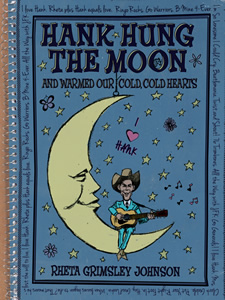In Hank Hung the Moon … and Warmed Our Cold, Cold Hearts, Rheta Grimsley Johnson spins a nostalgic web of memoir and biography, a tale of how her own life has been intertwined with that of the legendary Hank Williams. The book is a collection of stories, memories, reportage, and music history that catches at the elusive, high-lonesome ache his songs awaken in the heart of every Southerner of a certain age, people who remember the smell of an outhouse, who miss the flavor of bacon grease in their green beans.
Johnson was raised in and around Montgomery, Alabama, stomping grounds of the immortal Williams himself. She was born on January 30, 1953, exactly thirty days after the iconic country singer’s death on New Year’s Day. Her earliest memories play to a seventy-eight-rpm soundtrack of Williams’s yodeling, pain-wracked ballads, but she keeps the actual memorabilia stored in a cardboard box labeled “Hank.” It’s filled with material collected by Johnson’s late husband, Don Grierson, a journalism professor at the University of Alabama.
 Johnson, now a nationally syndicated columnist, is a former reporter and columnist for the Memphis Commercial Appeal, where she became a finalist for the 1991 Pulitzer Prize in commentary. She is also the author of three other books: Good Grief: The Story of Charles M. Schultz (1989), Poor Man’s Provence: Finding Myself in Cajun Louisiana (2008), and Enchanted Evening Barbie and the Second Coming (2010).
Johnson, now a nationally syndicated columnist, is a former reporter and columnist for the Memphis Commercial Appeal, where she became a finalist for the 1991 Pulitzer Prize in commentary. She is also the author of three other books: Good Grief: The Story of Charles M. Schultz (1989), Poor Man’s Provence: Finding Myself in Cajun Louisiana (2008), and Enchanted Evening Barbie and the Second Coming (2010).
In telling her own story, Johnson takes out her extensive Hank Williams collection and admires it in the flickering light of the singer’s enduring magic: “I knew Hank, same as I knew my father and mother, or my grandparents, or others who worked to make my life happier and complete. I knew all my life what I’d missed, even before I could articulate that longing. I grew up with Hank a fixture in my life, a real presence, same as did most Southerners. His music was everywhere in our formative years, oozing out of honkytonks and truck stops and car radios and black-and-white television sets. Hank was true. Hank was music. Hank was life.”
 This little book is filled with stories from three decades of Johnson’s own life as a reporter in the Deep South. During a career that touched surprisingly often on Williams and his legacy, Johnson covered Jett Williams—Hank’s illegitimate daughter—and her long struggle for her patrimony. She interviewed Hank impersonators, Cajun queens who sang Hank’s songs in French, and a veteran member of Hank’s band, the Drifting Cowboys. These stories appear alongside more intimate memories of grade-school crushes, marriages, widowhood, and the scent of honeysuckle on grandma’s porch in Colquitt, Georgia. She stirs it all into a rich, hot jambalaya.
This little book is filled with stories from three decades of Johnson’s own life as a reporter in the Deep South. During a career that touched surprisingly often on Williams and his legacy, Johnson covered Jett Williams—Hank’s illegitimate daughter—and her long struggle for her patrimony. She interviewed Hank impersonators, Cajun queens who sang Hank’s songs in French, and a veteran member of Hank’s band, the Drifting Cowboys. These stories appear alongside more intimate memories of grade-school crushes, marriages, widowhood, and the scent of honeysuckle on grandma’s porch in Colquitt, Georgia. She stirs it all into a rich, hot jambalaya.
Hank Hung the Moon captures William’s tortured life and tragic, puzzling death and gives a nod to all the great singers who have covered his songs, including Norah Jones and her popular rendition of “Cold, Cold Heart.” But Johnson reminds readers that the emaciated, hard-ankled man from Alabama, who “swayed like a cobra” when he was drunk on stage, had “lived it, loved it, plowed it, drunk it.” Without much education and barely able to read music, he also wrote it.
January 1, 2013, will mark the sixtieth anniversary of Hank Williams’s death. Johnson ends her book by noting his “emotional understanding,” a profound kind of empathy which for many artists comes only with age. Williams was just twenty-nine when he died: “Hank arrived early at that station of the Cross,” she writes.
Johnson’s writing is evocative of post-war America and the decades that followed, mixing humor and pathos in just proportion. For scholars of Hank Williams, this memoir may not add much to the canon of his life and work, but for fans and casual readers alike, this brief plunge into the artist and the era is well worth the read.
Tagged: Nonfiction




